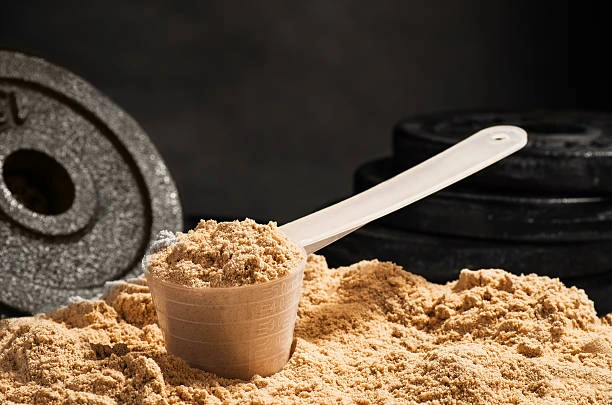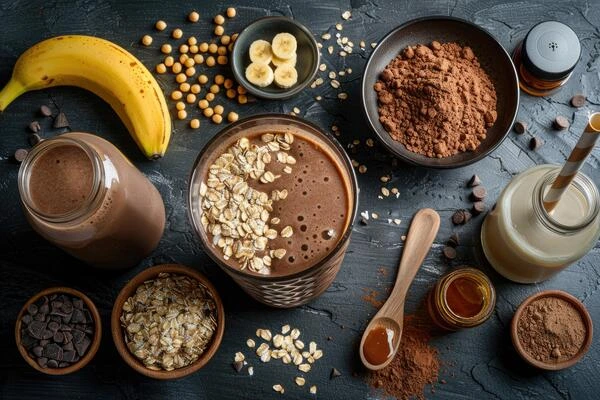
Types of Protein Powders Explained: Best Options for Your Goals
Whey, casein, plant-based, isolates—what’s the difference? Discover the pros and cons of each type of protein powder and which one fits your fitness goals best.
Protein powders have been a fitness influencers best friend for quite some time now. But what nobody tells you is there are many different kinds of protein powders to choose from.
Today, we're going to walk you through the 7 types of protein powders available for you to make the right choice when out shopping. But first, let's define what they are.
What is Protein Powder?
Protein powder is essentially just that, a powdered protein. Protein is an essential macronutrient that your body utilizes for everyday functions. In fitness, you'll primarily be focused on how protein is used to rebuild muscle after a workout - explained here.
The best use of protein powder is for hitting the right macro count on a consistent basis to align with your specific fitness goals. There are a handful of main categories that each protein powder will fit in however:
1. Protein Concentrate: Synthesized by extracting protein through heat, acids, or certain enzymes.
2. Protein Isolate: Further filtered to extract the specific proteins, reducing the fat and carbohydrates.
3. Clear Protein Isolate: Filtered even more than regular isolates. So much so that they appear clear.
4. Casein: Derived from cow milk and sought after for its slow digesting property.
5. Non-Dairy Protein: From sources other than meats such as peas or lintels. Perfect for athletes looking to stick to a vegan style of dieting.
But this is just the beginning of what makes up the list of protein powders. To find the best fit for your specific goals, let's dive into the specifics of the 7 most common protein powders.
7 Types of Protein Powders
There are of course more than 7 types of protein powders, but these are the most common among what you will likely find on the shelves at your local grocery or supplement store. And kicking off with number one, we have a heavy hitter.
1. Casein
Casein is known as a heavier protein since it digests slowly in the stomach. The reason for this is that it curdles in the stomach acids, making it a slower release of amino acids. Many bodybuilders will use this as a supplement before bed for a long release of amino acids where they would otherwise be in a long state of fasting. This preserves muscle and aids in muscle recovery.
2. Whey Protein
Whey is a fast-digesting milk-based protein, often best taken right after a workout. This dairy-derived protein is widely considered one of the most effective sources for muscle growth thanks to its rich profile of branched-chain amino acids (BCAAs) and quick digestion rate. While it's occasionally found in food products, it's most commonly sold as a standalone powder supplement.

Whey is classified as a complete protein, meaning it provides all nine essential amino acids your body needs to function properly. What sets high-quality whey apart is its elevated level of leucine—an amino acid crucial for triggering muscle protein synthesis and supporting recovery.
3. Whey Concentrate
The term “whey” actually refers to a few different types of protein, each processed to varying degrees. Whey concentrate is considered the least refined form, often containing around 70–80% protein by weight. The rest typically consists of carbohydrates and fats, which makes it less protein-dense compared to other whey varieties.
Because of this, whey concentrate tends to be slightly higher in calories, which might be a drawback if you're trying to lose weight. That said, the calorie difference is usually minimal, so it’s not a major concern for most people—especially if your overall diet is well managed.
4. Whey Isolates
To qualify as a true whey isolate, a protein powder must contain at least 90% protein by weight. This high level of refinement results in a purer product that’s especially popular among athletes and fitness enthusiasts aiming for maximum protein with minimal extras.
Because of its minimal fat and carb content, whey isolate is typically lower in calories, making it a smart choice for those managing their intake while still hitting protein goals. Its reduced lactose content is also a bonus for anyone with dairy sensitivities. The tradeoff? That extra processing usually comes with a slightly higher price tag compared to less refined options like concentrate.
5. Whey Hydrolysate
Whey hydrolysate is a highly processed form of whey protein that undergoes heat, enzymatic, or acid treatment to partially break down the peptide bonds. This "pre-digestion" makes it faster to absorb and generally easier on the digestive system, especially for those with sensitivities.

Research suggests that whey hydrolysate is just as effective as regular whey—and in some animal studies, it has even shown enhanced results in stimulating muscle protein synthesis. However, this level of refinement makes it one of the priciest protein options available, and it’s not as commonly stocked as other types like concentrate or isolate.
6. Plant-Based Protein Powders
You might be surprised to learn that it’s entirely possible to meet your protein needs without ever consuming dairy or other animal products. While plant-based protein powders are often seen as lower quality due to being “incomplete” (lacking one or more of the nine essential amino acids), they can still be a great option—especially for those with dietary restrictions.
Many plant-based powders also tend to have lower digestibility scores, such as a reduced PDCAAS rating. However, top-tier vegan protein blends often combine multiple sources—like pea and rice protein, sunflower seed, or pure soy—to fill in the amino acid gaps. In fact, soy stands out as one of the only complete plant-based proteins available, making it a smart choice for those following a plant-forward diet.
7. Egg Powders
Egg protein powders are a less common option compared to more mainstream choices like whey or plant-based blends. While they tend to be pricier than whey, they offer a solid alternative for those with dairy allergies or anyone curious to try something different.
If you can find a quality egg-based product, it can be a great addition to your supplement lineup—providing a complete amino acid profile and a smooth digestibility experience for many users.
Do You Need Protein Powder?
In short, no. While protein powders are certainly convenient, you can still achieve much of your protein needs through whole foods, such as:
• Beef
• Chicken
• Eggs - Whole or Egg Whites
• Dairy
• Soy
That said, protein powders offer an efficient, on-the-go solution—especially for those with busy schedules, higher protein requirements, or specific training goals. They're not a necessity, but they can be a powerful tool when used to fill the gaps in your nutrition plan
How to Choose the Right Protein Powder
With so many options on the shelf, picking the right protein powder can feel overwhelming. The best approach is to start with your personal goals and dietary needs:
For muscle growth: Look for a complete protein like whey isolate or whey hydrolysate for fast absorption and high leucine content.
For weight loss: Choose a low-calorie, high-protein option like whey isolate or clear isolate with minimal fats and carbs.
For plant-based diets or allergies: Opt for a vegan blend (like pea and rice) or soy protein, and check the label for a complete amino acid profile.
For nighttime recovery: Consider casein for its slow-digesting properties that help preserve muscle during sleep.
For digestive sensitivity: Try whey hydrolysate or even egg protein, both of which are generally easier on the stomach.
Always check ingredient labels for fillers, added sugars, or artificial flavors if you’re trying to keep your nutrition clean.
Final Thoughts
At the end of the day, protein powders are just one piece of the puzzle. The most important factor in reaching your fitness goals is consistency—in training, nutrition, and recovery. Protein powders can help, but they won’t replace hard work, balanced meals, or smart planning.
If you're not sure where to start, let Meta Mentor take out the guesswork. Our AI-powered fitness app recommends the right macros, meals, and workouts based on your individual goals—and yes, even helps you pick the right protein powder.
👉 Start your 7-day free trial today and see how personalized fitness can change everything.

